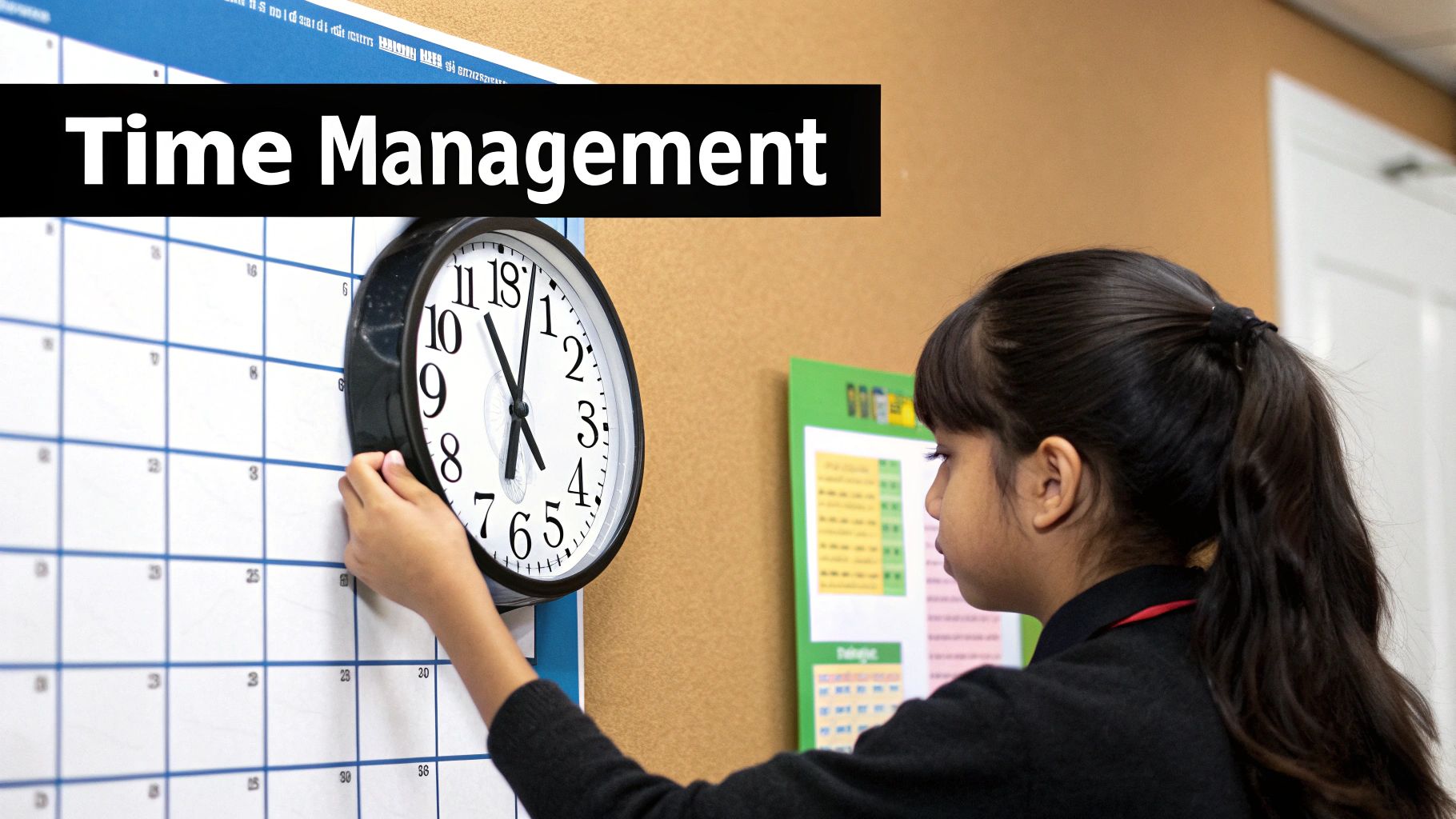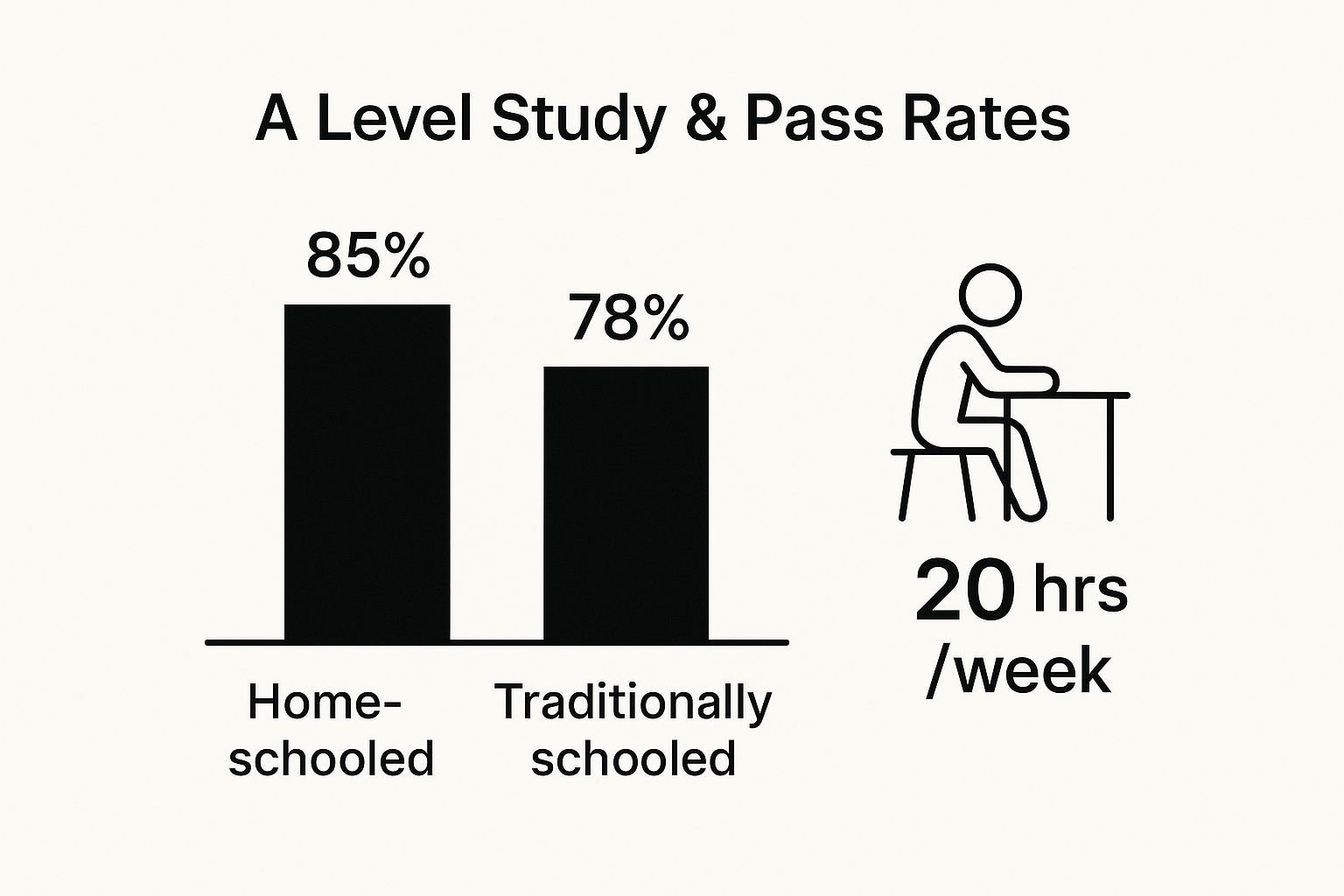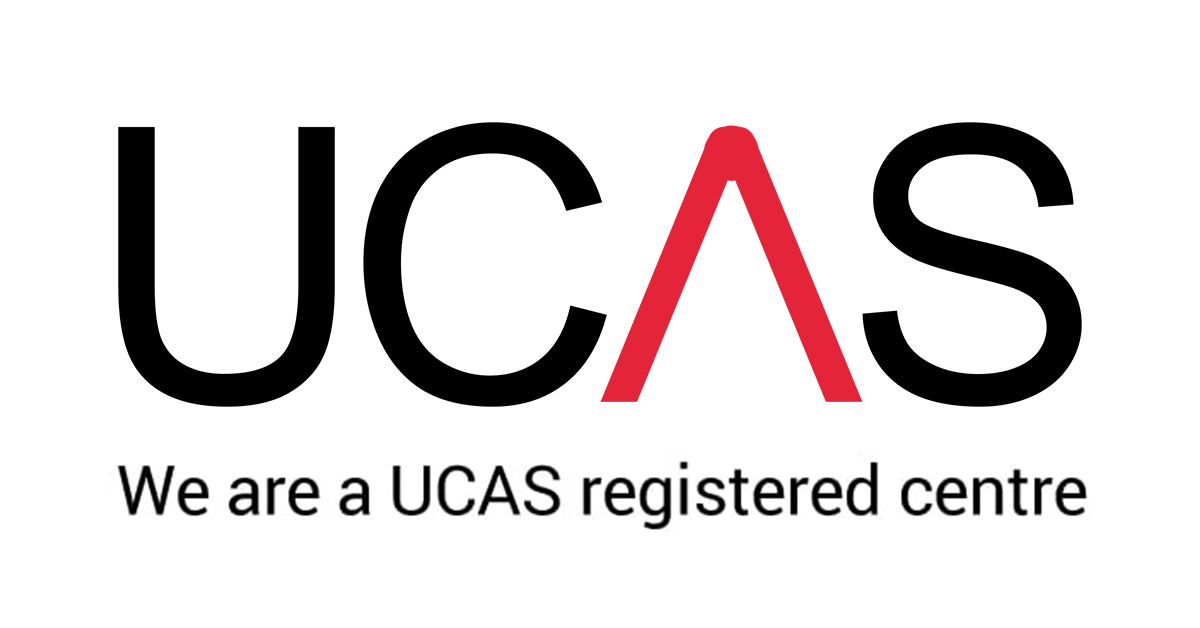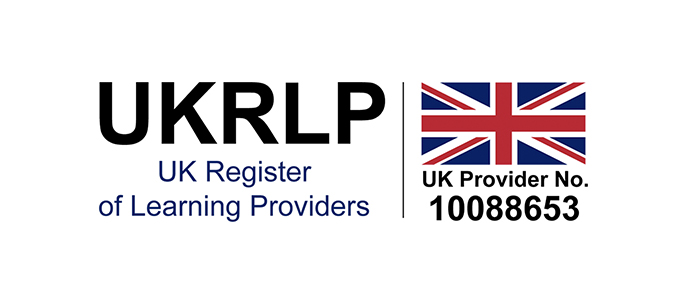A-Level home schooling is a perfectly legitimate and increasingly popular way for students to get their qualifications. It offers a flexible and personalised alternative to the rigid structure of a traditional school, empowering families to build an educational experience that truly fits their child's academic goals, learning style, and wellbeing.
Is A-Level Home Schooling Right for Your Child?
Deciding to home school for A-Levels isn't about simply replacing a physical school. It’s about consciously creating a supportive environment where your child can genuinely flourish. This is a path that puts their individual needs, passions, and mental health right at the centre of their education, and the reasons families choose it are always deeply personal.
For some, it's all about academic focus. Imagine an aspiring medic who wants to dive deep into Biology and Chemistry. At home, she can go far beyond the syllabus without being held back by the pace of a mixed-ability classroom. You can see the relief in her eyes when she realises she has the freedom to explore advanced topics and prepare for tough university entrance exams on her own schedule.
For others, the drive is creative freedom. A gifted art student might need long, uninterrupted stretches of time to build a portfolio for a top design school. A typical school day, chopped into 45-minute lessons, can kill that creative flow. Home schooling lets him dedicate whole days to his craft whenever inspiration hits, allowing his passion to breathe and grow without constraints.
Why More Families Are Choosing This Path
The move towards home education is more than a niche trend; it’s a growing movement. Data from the 2023/24 academic year shows a significant rise, with an estimated 153,300 children now being taught at home in the UK.
The motivations are incredibly varied. Around 23% of families point to lifestyle or philosophical reasons, while others highlight specific issues within the school system. What’s really telling is that 14% are prioritising their child’s mental health, and 13% cite bullying or a lack of support for special educational needs as the final straw.
This data reveals a crucial truth: home schooling is often a proactive choice for a child's wellbeing. It can be an incredibly powerful way to create a safe, low-pressure space where a teenager can rebuild their confidence, manage anxiety, and rediscover a love for learning away from the social pressures that can make the sixth-form years so tough.
"The goal isn't just to get the grades. It's to nurture a confident, self-motivated young adult who is excited about their future. A-Level home schooling allows you to design an education that serves the whole person, not just the exam candidate."
To help you weigh these factors, here’s a breakdown of the key things to think about.
Key Considerations for A-Level Home Schooling
This table summarises the core factors to consider when deciding if home education is the right fit for your child's A-Level years.
| Factor | What to Consider for Your Child | Potential Action |
|---|---|---|
| Learning Style & Motivation | Is your child a self-starter who thrives with independence, or do they need more structured guidance to stay on track? How do they feel most confident when learning? | Sit down with your child and ask them. For example: "Would you feel more excited about learning if you could plan your own week, or would you feel safer with a set timetable?" |
| Social Needs | How important is daily social interaction with peers for their happiness and development? Do they have friends outside of school already? | Together, you could brainstorm a 'social plan'. This might involve joining a local climbing gym, a book club, or even a weekly online gaming group with friends. |
| Academic Goals | What subjects make their eyes light up? What are their dreams for the future? Are these subjects you can support at home? | Research university entry requirements for their dream courses. If they need Physics and it feels daunting, explore online schools or a local tutor who could become their mentor. |
| Mental Health & Wellbeing | Is the current school environment causing stress, anxiety, or burnout? Would a quieter, more flexible setting help them thrive? | Have an open, honest conversation. Ask, "What does a good day feel like for you?" A calmer home environment can be transformative for a child who feels overwhelmed. |
| Family Resources | Do you have the time, energy, and financial resources to support their A-Level studies at home? What would this change mean for the family dynamic? | Create a realistic budget and a 'family charter' for how you'll all support each other. Factor in costs for exams, resources, and potential tutoring. |
Thinking through these points honestly will give you a much clearer picture of whether this path is a good match for your family's circumstances and your child's needs.
Putting Your Child at the Centre
Ultimately, the decision comes down to knowing your child. Does your teenager thrive on a predictable structure, or do they excel when given more autonomy? Are they a natural self-starter who will relish the independence, or would they feel more secure with the guided support that an online programme provides?
Asking these questions is the first and most important step. When you focus on your child's happiness and potential, you can figure out if the flexibility and personalisation of A-Level home schooling are the right fit. There are many benefits to this approach, and you can explore the advantages of homeschooling to see how it supports a wide range of students. This journey is about empowering your child to succeed on their own terms, building a foundation for both academic achievement and lifelong wellbeing.
Crafting a Custom A Level Curriculum

This is where the real magic of A-Level home schooling begins. You have an incredible opportunity to design an education that fits your child like a glove, merging their university ambitions with what genuinely sparks their curiosity. It’s a chance to move beyond a one-size-fits-all model and build something truly empowering.
This isn't just about picking subjects from a list. It’s a thoughtful process of discovery, a conversation with your child about who they are and who they want to become. This is your chance to create a bespoke education that challenges, inspires, and sets them on a trajectory they have chosen for themselves.
Aligning Subjects with Future Ambitions
The best place to start is by working backwards from your child's long-term goals. If they have a clear idea of what they want to study at university, that gives you a solid foundation for their A-Level choices. Most university courses have specific subject prerequisites, so getting this right from the very beginning is absolutely essential.
For instance, a student with their heart set on an engineering degree will need a very specific combination of A-Levels. Their curriculum should be built around:
- Mathematics: This is non-negotiable for almost all engineering courses.
- Physics: Provides the fundamental scientific principles needed for the degree.
- Further Maths or Chemistry: Often listed as a preferred or required third subject, depending on the specialisation (like Chemical Engineering).
In contrast, a budding literature student aiming for a top humanities programme will have a completely different focus. Their ideal A-Level combination might look more like this:
- English Literature: The core subject that demonstrates their passion and analytical skills.
- History: Complements literary studies by providing crucial historical context.
- A Modern Foreign Language (e.g., French or Spanish): Showcases linguistic ability and opens up comparative literature options.
This kind of strategic selection ensures your child isn't just studying subjects they enjoy, but is also building a powerful, coherent application for their chosen degree.
Building a Resource Toolkit
Once you've mapped out the subjects, it’s time to gather the best learning materials. One of the greatest advantages of home schooling A-Levels is the freedom to choose resources that perfectly match your child's learning style, rather than being stuck with whatever a school provides.
A well-rounded toolkit should include a mix of physical and digital resources. A crucial first step is to identify the correct exam board (like AQA, Edexcel, or OCR) for each subject, as this dictates the specific syllabus and recommended materials.
Your goal is to create a rich and varied learning environment. Combining a core textbook with dynamic online platforms, video tutorials, and past papers gives your child multiple ways to engage with and master the material.
Key resources to source include:
- Exam Board Approved Textbooks: These are the cornerstone of the curriculum, ensuring complete syllabus coverage.
- Revision Guides and Workbooks: Excellent for reinforcing knowledge and practising exam-style questions.
- Online Learning Platforms: Services like Seneca Learning or Save My Exams offer interactive content, quizzes, and detailed notes.
- Past Papers and Mark Schemes: Freely available on exam board websites, these are absolutely vital for exam preparation.
When you're crafting a unique educational plan, it's also worth exploring resources on customizing learning pathways and courses to really tailor the experience to your child's needs.
Tackling Practical Subjects
So, what about subjects like Biology, Chemistry, and Physics that require hands-on experiments? This is a common concern for families considering A-Level home schooling, but it's entirely manageable with a bit of planning.
The practical endorsement is a separate, pass/fail component of science A-Levels. To achieve this, private candidates must complete a set number of required practicals under supervised conditions. You simply can't replicate this at the kitchen table with a basic science kit.
Instead, you’ll need to partner with an external provider. Here are your main options:
- Registered Exam Centres: Many centres that accept private candidates for exams also offer 'practicals-only' courses. These usually run as intensive blocks over several days, often during school holidays.
- Distance Learning Providers: Some online course providers have partnerships with labs and will arrange the practical sessions as part of their A-Level package.
- Specialist Lab Providers: A number of companies exist solely to provide these intensive practical courses for home-schooled students.
It's crucial to research and book these practical sessions well in advance, as places can fill up quickly. By planning ahead, you ensure your child meets all the requirements for their science A-Levels, keeping their university options wide open.
Designing a Schedule for Success and Wellbeing

One of the most liberating parts of A-Level home schooling is finally escaping the rigid 9-to-3, bell-driven school day. The goal isn't to perfectly replicate that structure at home. Instead, it’s about crafting a rhythm that respects your child's natural energy, encourages deep learning, and fiercely protects their mental wellbeing.
Feeling overwhelmed at the thought of planning it all? You’re not alone. Many parents initially worry about getting the balance right between productivity and downtime. The key is to see the schedule as a flexible blueprint, not a set of concrete rules—one designed with your child, putting their needs front and centre.
This shift in perspective is everything. It transforms scheduling from a chore into an empowering exercise in creating a life that actually works for them.
Finding a Rhythm That Fits
Every student is different, and their schedule should reflect that. A morning person might power through complex Maths problems at 8 AM, feeling sharp and focused. A night owl, on the other hand, might do their best, most creative work on a history essay long after dinner. A-Level home schooling allows you to honour these natural rhythms.
Think of these flexible models as starting points, ready to be adapted to your child’s unique personality.
- The 'Deep Dive' Schedule: This is perfect for the student who feels the frustration of having to switch gears just when they're getting into a topic. Imagine dedicating a whole Monday to Biology—watching documentaries, doing practice questions, and really immersing themselves. This total focus can lead to moments of genuine breakthrough.
- The 'Task-Based' Schedule: Ideal for the self-motivated student who thrives on autonomy. Instead of clock-watching, they work from a weekly checklist: "Read Chapter 5 of Chemistry," "Complete three past paper essays for English." This builds incredible trust and independence. The feeling of ticking off the last task on a Friday afternoon, knowing they've managed their own time, is a huge confidence booster.
The beauty of these models is that they can be mixed and matched. A student could use a 'deep dive' day for a subject they find particularly challenging and a 'task-based' approach for subjects they feel more confident in.
Building in Time to Breathe
A relentless focus on academics is the fastest route to burnout. A successful home schooling schedule understands that breaks, hobbies, and social time aren't optional extras; they are essential components of the learning process.
Wellbeing has to be intentionally scheduled, just like a study session. Neglecting this is a common mistake that can undermine all your hard work. When a teenager is rested and happy, their capacity to learn and retain information increases dramatically.
"A sustainable A-Level schedule is one where downtime and passion projects are given the same priority as exam preparation. This balance prevents burnout and nurtures a student who is engaged, curious, and mentally resilient."
Here’s how to embed wellbeing directly into your weekly plan:
- Physical Activity: Block out time for a daily walk with the dog, a gym session with a friend, or a YouTube yoga class in the living room. This is non-negotiable for managing the inevitable stress of A-Levels.
- Social Connection: Proactively plan a weekly coffee with friends, join a local Dungeons & Dragons group, or schedule regular video calls with family. Maintaining these ties is a lifeline.
- Hobbies and Passions: Ensure there are dedicated slots for whatever recharges them—be it an hour of playing the guitar, coding a new game, or just getting lost in a good book.
- Genuine Downtime: Seriously, schedule time with absolutely nothing planned. This is when the mind can wander, decompress, and process everything it has learned. It's not wasted time; it's recovery time.
Fostering Independence with Simple Tools
As your child progresses through their A-Levels, they should take increasing ownership of their schedule. This is a brilliant opportunity to build life skills they’ll absolutely need at university and beyond. A few simple digital tools can make this transition feel seamless.
Using a shared digital planner like Google Calendar or a project management app like Trello can be a game-changer. You can sit with them to set it up initially, plugging in key deadlines for assignments and future exam dates. Then, you empower them to fill in their own weekly study blocks, breaks, and social activities.
This simple act of handing over control fosters a powerful sense of responsibility. It's a way of saying, "I trust you." It helps them visualise their commitments and learn how to balance their academic workload with their personal life, all while feeling respected. This is the very essence of child-centred A-Level home schooling.
Navigating Exams as a Private Candidate

The thought of final exams can cast a long shadow, often feeling like the most complex puzzle in the entire A-Level home schooling journey. It's a question I hear from parents all the time: how do you get from a curriculum taught at the kitchen table to an officially recognised grade that opens university doors?
The answer lies in becoming a private candidate. It might sound mysterious, but it's a well-trodden and perfectly manageable path.
Breaking it down into clear steps transforms this daunting challenge into an actionable plan. It’s all about being organised and proactive, making sure your child’s hard work is formally recognised without any last-minute panic. With the right approach, you can handle the logistics smoothly, leaving your child free to focus on what really matters—their studies.
Finding and Registering with an Exam Centre
Your first practical task is to find a school or college willing to host private candidates for your chosen subjects and exam boards (like AQA or Edexcel). The reality is that not all centres do, so it's absolutely vital to start your search early. A great place to begin is the Joint Council for Qualifications (JCQ) website, which often provides a list of available centres.
I always advise parents to start contacting potential centres in the autumn term of the exam year. This gives you a comfortable buffer to find a suitable location and get your head around their specific procedures and deadlines—which are often much earlier for private candidates than for their own students.
When you get in touch, have a list of questions ready:
- Which A-Level subjects and exam boards do you accept private candidates for?
- What are your registration deadlines and all the associated fees?
- How do you handle coursework submissions or science practicals?
- What does support on exam day look like?
Be prepared for the costs, as they can vary significantly. You're typically looking at anywhere from £150 to over £300 per A-Level subject. This fee covers the centre's administration, invigilation, and the exam board's own entry fee. Factoring this into your A-Level home schooling budget from the start will save you a headache later on.
The Challenge of Coursework and Science Practicals
This is where things can get a bit tricky. For subjects like English Literature or History, coursework is often a mandatory component. Similarly, science A-Levels require a Practical Endorsement. This makes your choice of exam centre absolutely critical.
You must find a centre that can not only host the exam but also assess and submit your child’s coursework or facilitate the required lab sessions.
Many centres that accept private candidates will have specific provisions for this. For science practicals, for example, it's common for them to be completed during intensive multi-day sessions at the centre itself. It’s an added logistical step, but it's entirely manageable with some forward planning. Just be sure to book these sessions well in advance, as places fill up fast.
By tackling the practicalities of coursework and lab work early, you remove a huge source of potential stress. This allows your child to focus on their learning, confident that the administrative side is already handled.
Creating a Confident Exam Taker at Home
Beyond the logistics, your role is to help your child build the confidence and resilience they'll need for these high-stakes exams. Replicating exam conditions at home is one of the most powerful tools in your arsenal. This means more than just timing a past paper; it’s about simulating the entire experience.
Start by setting up a quiet, dedicated space free from any distractions. Insist on the same rules they’ll face in the hall: no phones, no notes, and strict timing from start to finish. For example, have them sit a full 2-hour Maths paper one morning. Afterwards, talk about how it felt. Did time fly by? Did they feel a moment of panic? This practice does more than just test knowledge; it trains their focus, sharpens their time management, and dials down the anxiety that comes with unfamiliar situations.
When exam day arrives, they'll walk into the centre feeling prepared not just for the questions, but for the environment itself. This dedicated preparation really pays off. Research consistently shows that home-schooled students can achieve incredible academic outcomes, often scoring 15% to 30% higher than their peers on standardised tests.
For families who find these logistics overwhelming, partnering with an online school can be a huge relief. At Queen's Online School, for example, we are a Pearson Approved Examination Centre and can handle all exam entries for our students. This integrated support system removes the administrative burden entirely, allowing you and your child to concentrate fully on their success. Exploring the world of online home education in the UK can reveal pathways that simplify this whole process.
Finding the Right Mix of Self-Study and Online Support
One of the most liberating realisations for any parent embarking on A-Level home schooling is this: you do not have to be the expert in everything. It’s a huge relief. The pressure to single-handedly teach advanced organic chemistry or dissect Shakespearean sonnets can feel immense, but building a successful learning plan isn’t about being the sole teacher.
Instead, your role shifts to that of a skilled architect of your child's education. This means designing a powerful hybrid model that blends the wonderful freedom of self-study with the focused, expert guidance of an online school. It's about finding that perfect balance where your child feels both independent and fully supported.
The Independent Learner vs The Blended Approach
Imagine your child is a passionate and voracious reader, set on studying English Literature at university. They might absolutely thrive on a self-study path for this subject, spending hours lost in classic novels and crafting essays on their own terms. This is where the autonomy of home education truly shines.
But what if that same student finds A-Level Chemistry completely baffling? The complex equations and abstract concepts might leave them feeling frustrated and defeated. This is the moment where trying to "go it alone" can do more harm than good, chipping away at their confidence.
This is precisely where a blended approach becomes so powerful. You can preserve that precious independence in subjects where they excel while bringing in targeted, professional support for the ones they find challenging.
Comparing A-Level Home Schooling Approaches
Deciding between a purely independent approach and a blended model can feel like a big decision. This table breaks down the key differences to help you see what might work best for your family's needs and your child's learning style.
| Feature | Independent Self-Study | Blended Model (with Online School) |
|---|---|---|
| Curriculum | Parent/student curates all materials and resources. | Uses a professionally designed, exam-board-aligned curriculum. |
| Teaching | Relies on student's self-discipline and parent's guidance. | Live lessons with specialist teachers for challenging subjects. |
| Social Interaction | Limited to external groups or activities. | Built-in peer interaction through live classes and school community. |
| Practical Endorsements | Requires sourcing an external exam centre to oversee practicals. | Often managed and facilitated directly through the online school provider. |
| Cost | Generally lower, but requires significant time investment. | Higher than pure self-study, but provides targeted expert support. |
| Accountability | Rests solely on the student and parent. | Shared responsibility with teachers providing structure and deadlines. |
Ultimately, the best approach isn't one-size-fits-all. It's about strategically using the resources available to build a supportive and effective learning environment tailored to your child.
Identifying Where to Focus Your Energy
Deciding which subjects are best for self-study and which require external support comes down to an honest conversation with your child. It's about recognising their strengths, acknowledging their anxieties, and making a strategic choice that serves their wellbeing.
Here’s a simple framework to help you decide:
- Passion Subjects: For subjects your child genuinely loves and has a natural aptitude for, like a gifted artist studying Photography, a self-study approach rich with resources can be incredibly effective.
- Challenging Subjects: For subjects that are known to be difficult or that your child finds intimidating, like Further Maths, enrolling them in a structured online course provides an essential safety net and a confidence boost.
- Practical Subjects: Sciences like Biology, Chemistry, and Physics require a formal practical endorsement, making structured support from a provider almost essential.
The trend of home schooling at A-Level in the UK has grown substantially, with the number of children receiving elective home education rising to approximately 111,700 by autumn 2024. This isn't surprising when you consider the outcomes and the costs. While private education fees can exceed £15,000 per annum, home schooling costs average around £500 per year per child, making it an accessible alternative that produces excellent academic results.

This data shows that with focused, efficient study, home-schooled students not only meet but often exceed the pass rates of their traditionally schooled peers.
Creating a Sustainable Support System
For a blended model to work, the support needs to be seamless and high-quality. This is more than just finding a tutor; it's about integrating an online school into your home education ecosystem. For the self-study portions to be effective, it’s also crucial to enhance focus and concentration during study sessions.
"The goal is to build a safety net of support that empowers your child. Knowing an expert teacher is just a click away for their toughest subject gives them the confidence to fly solo in others."
An online school like Queen’s Online School can fill this role perfectly. By enrolling your child for just one or two specific subjects, you gain access to subject-specialist teachers, a structured curriculum, live interactive classes, and a community of peers.
This approach offers the best of both worlds. Your child gets the personalised attention and expert instruction they need to conquer difficult topics, while you are freed from the stress of teaching subjects outside your comfort zone. This partnership ensures academic rigour across the board, without sacrificing the personal touch that makes home education so special. By exploring the options for https://queensonlineschool.com/online-a-levels-uk/, you can see how easily this integration can work.
Still Have Questions About A Level Home Schooling?
Even with the best plan in place, taking the leap into A-Level home schooling can feel like a step into the unknown. It’s completely normal to have a few lingering worries. You’re making a huge decision for your child’s future, after all, and you deserve to feel confident and prepared.
Let's walk through some of the most common questions we hear from parents. Our goal here is to replace any uncertainty with clear, straightforward answers, so you can move forward with total peace of mind.
How Do Universities View A-Levels from Home Schooled Students?
This is a big one, but the answer is simple: universities in the UK hold A-Levels from home-schooled students in exactly the same high regard as those from traditional schools. What admissions tutors really care about are the final grades, the applicant's genuine passion for their subject, and their potential to succeed at university. Where the qualification came from is secondary.
In fact, a well-written personal statement that explains the reasons for choosing home schooling can be a massive advantage.
It shows independence, self-discipline, and a proactive attitude towards learning—all qualities that top universities are actively looking for. It tells the story of a student who truly owns their education.
What About Socialisation and Friendships?
This is probably the most frequent concern we hear, but the reality of social life for home-schooled teens is often far richer than people imagine. It just happens outside the bubble of a single school year group. The trick is to be intentional about creating those opportunities.
Encourage your child to dive into their interests outside of their studies. This could mean anything from:
- Joining a local sports team or drama club.
- Volunteering for a cause they believe in.
- Getting a part-time job.
- Connecting with local home education co-ops and groups.
These activities allow them to build real friendships with a wider range of people, connecting over shared passions rather than just shared classrooms. For example, a teen who loves animals could volunteer at a local shelter, finding friends who share that same deep compassion.
Can My Child Get into a Top University?
Absolutely. Russell Group universities, including Oxbridge, regularly accept applications from home-schooled students. Their admissions process is designed to spot academic talent and potential, no matter where the learning happened.
Building a strong application boils down to the same things for every student. The focus has to be on achieving excellent A-Level grades (both predicted and final), crafting a standout personal statement, and preparing meticulously for any admissions tests or interviews.
This is where the flexibility of A Level home schooling can become a secret weapon. It often creates more space for "super-curricular" activities—things like deep-diving into extra reading, taking relevant online courses, or working on projects related to their chosen degree. These are the very things that demonstrate passion and make an application shine for top-tier universities. For example, a prospective history student could spend a month volunteering at a local museum archive—an experience that speaks volumes about their dedication.
How Do We Manage Science Practicals?
This is a critical practical point if your child is planning to study Biology, Chemistry, or Physics. The A-Level specifications for these subjects include a set of mandatory experiments, known as the Practical Endorsement, which must be assessed by a qualified teacher.
You can't complete this part at home. Instead, you'll need to find an approved exam centre that runs these practical sessions for private candidates.
Typically, this involves attending a few intensive lab days at their facility. It’s crucial to research these centres and book your child’s spot well in advance, as places fill up quickly. The websites for the main exam boards (AQA, Edexcel, OCR) all have lists of approved centres that offer this service, ensuring your child can meet every requirement for their science A-Levels.
At Queen's Online School, we understand these questions because we help families navigate them every single day. We offer a complete framework of support, from subject-specialist teachers for challenging A-Levels to handling all exam entries as a Pearson Approved Examination Centre. Discover how we can make your A-Level home schooling journey clear, confident, and successful by visiting us at https://queensonlineschool.com.







